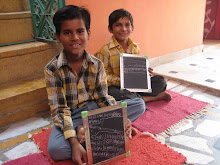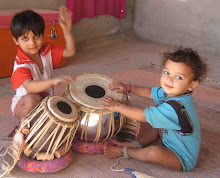Over coffee with a friend the other night, I was reminded of an excellent old F. Scott Fitzgerald quote that lay in my battered moleskin journal. "The test of first rate intelligence," Fitzgerald bellowed from the pages of a 1936 Esquire, "is to hold two opposing views in one's mind at the same time and still function. One should be able to see that things are hopeless, yet be determined to make them otherwise."
It's a mighty mouthful that is sticky and awkward to chew, but paves the blueprints and cornerstones of our work out in Rajasthan. Caste barrels down on our little ones, bringing them into this world without a birth certificate, forcing them to live on less than 25 cents a day and robbing them of their right to participate in a society begging for justice-fueled change. But caste is far from everything. It is one reality in a world of many.
Caste is neighbored by an unbelievably musical legacy that can be found in no other pocket of the globe. It is an artistic heritage that enables students to stare defiantly and compassionately in the face of all the crushing forces telling them they are worthless and say, as Rasul Khan did, "I'll be an engineer" or Fridah Khan, "I will be a very, very good teacher."
Rasul and Fridah know the world is not a warm place for them. Yet they also know that they have the capacity to rewire this reality towards a habitat of justice and hope. The music and the education go hand-in-hand, as necessary as having both a heart and a mind. And so we move forward, supported by the backbone of Folk Arts Rajasthan, our parent non-profit, with these two realities in our hands, functioning with both the weight of reality and hope.
Tuesday, January 20, 2009
Sunday, January 4, 2009
If you see a turtle on a fencepost...
FIRST and foremost: HAPPY 2009 to you and yours! May it be a year brimming with merriment and peace.
SECOND and just as foremost: Bill Clinton used to say that if you see a turtle sitting on a fencepost, it was there for a purpose. It did not drop from the sky or get swept up in a mighty gust of wind that placed it square on top of the fence. The turtle was there because something or someone intentionally put it there. Intentionality is a great word and one that I've become quite fond of through this Merasi School work.
Sarwar and I agree that The Merasi School is an intentional educational undertaking: each slice of programming is fueled with purpose and drive. And yet, there's something missing to that little equation, that undescribed x-factor that happens when your intended plans aren't unfolding as they should and expectations are dropping like flies on the roadside.

With this picture, for example, my plan was to get the kids to spell out 'THE MERASI SCHOOL' on the slates. But, as we primed and preened for the shot, what emerged was the discovery that Mr. Ali, the strapping lad in the center and a new student as of that day, didn't know how to spell 'MERASI.' And so a lesson instruced by his fellow slate-holders ensued.
But that's just one, bite-sized example of immediate reality or needs trumping intentions. Poverty, as we've talked about before, is a fickle master who will take your intentions and crush them like a two-ton stone crushes a china vase. Our intentions are well-founded and I used to think that reality gets in the way of my placing the turtle on the fence.
But what I'm slowing starting to believe is that I need to create more room for reality in the crafting of our intentions. Reality and all the baggage, packages and beautiful complications that come with, are powerful indicators of why the path from turtle in pond to turtle on fence is much more windy, precarious and beautiful than we originally bargained for.
SECOND and just as foremost: Bill Clinton used to say that if you see a turtle sitting on a fencepost, it was there for a purpose. It did not drop from the sky or get swept up in a mighty gust of wind that placed it square on top of the fence. The turtle was there because something or someone intentionally put it there. Intentionality is a great word and one that I've become quite fond of through this Merasi School work.
Sarwar and I agree that The Merasi School is an intentional educational undertaking: each slice of programming is fueled with purpose and drive. And yet, there's something missing to that little equation, that undescribed x-factor that happens when your intended plans aren't unfolding as they should and expectations are dropping like flies on the roadside.

With this picture, for example, my plan was to get the kids to spell out 'THE MERASI SCHOOL' on the slates. But, as we primed and preened for the shot, what emerged was the discovery that Mr. Ali, the strapping lad in the center and a new student as of that day, didn't know how to spell 'MERASI.' And so a lesson instruced by his fellow slate-holders ensued.
But that's just one, bite-sized example of immediate reality or needs trumping intentions. Poverty, as we've talked about before, is a fickle master who will take your intentions and crush them like a two-ton stone crushes a china vase. Our intentions are well-founded and I used to think that reality gets in the way of my placing the turtle on the fence.
But what I'm slowing starting to believe is that I need to create more room for reality in the crafting of our intentions. Reality and all the baggage, packages and beautiful complications that come with, are powerful indicators of why the path from turtle in pond to turtle on fence is much more windy, precarious and beautiful than we originally bargained for.
Subscribe to:
Comments (Atom)


